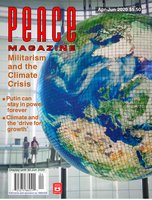
Peace Magazine April-June 2020, page 20. Some rights reserved.
Search for other articles by Ignat Kalinin here
A nuclear-armed state is changing its constitution in unpredictable ways—and no one cares.
On January the 15th president of Russian Federation, Vladimir Putin, in his annual address to the parliament, announced his intention to introduce several amendments to Russia’s basic law. Among other changes are: to give priority to national law over any international agreements; to abolish local municipalities’ independence from the executive branch; and to implement the State Council—a governing body about which we don’t know much—except that it will probably allow Putin to rule Russia for the rest of his life. Within only a few days these amendments were reviewed by a team of venerated citizens, including actors, cosmonauts, pianists, pole jumpers, figure skaters, and Molotov’s grandson, and were then forwarded to the lower chamber of parliament, the State Duma.
The current Duma was elected in 2016 with numerous frauds and a low turnout. It is totally under the control of one person loyal to Putin, the speaker of the House Vyacheslav Volodin. On March 2, prior to the second reading of the president’s amendments, Volodin announced that there are some others coming. Including one introducing the notion of “state-forming nationality” (presumably Russians), faith in God (which one?), marriage as a union of a man and a woman, and the inheritance (legal or spiritual) of the USSR. I remind our younger readers that the Communist superpower of the twentieth century was officially proclaimed an atheist state, in accordance with most left-wing ideologies, and no one can explain how it can be related to faith in God.
The Russian state was formed by Vikings. This fact is acknowledged by most scholars, and affirmed by both written and archeological sources. Thus, the state-forming nationality is presumably Swedish. The last omnipotent emperor of Russia, Nicholas II, was of German nationality, having only 1/125th Russian blood. Leon Trotsky, who actually built the USSR from scratch, was an Ashkenazi Jew. Joseph Stalin, who reinforced and ran the operation after stealing it from Trotsky, was a Georgian. Khrushchev and Brezhnev, who supervised the thing afterwards, were Ukrainians. And only Gorbachev, who tried to reform the Union, but in the end had to accept its dissolution, was a Russian.
The introduction of the “state-forming nationality” term is extremely controversial. It may be a joking matter, as I treat it here. But it also may boost a new movement of Russian nationalism, or even a casus belli for returning to the Russian Empire’s borders of 1917, with Ukraine, Georgia, Finland and parts of the Poland back under Moscow’s governing boundaries. I personally don’t believe it’s possible. But it is something that may be discussed a lot. alienating Russia from the West even more.
But it’s not about what Putin’s up to. It’s how he is doing it. Just as with the Crimea in 2014, we don’t fully understand the extremity of his intent. It’s a more of a special forces operation than a legislative action. The eldest Russian democratic party, Yabloko, even filed a suit against the president in the supreme court on the grounds that the procedure specified in the Constitution is being overlooked; the upcoming vote is a plebiscite model—you can either come and vote “yes”, or no one cares. There’s no provision for a national referendum and even debates about the amendments in regional parliaments will be bypassed.
On April 22, probably around 20 percent of Russians—mostly school teachers and public utility workers—will show up at the polling stations and approve all of the amendments. It will not even be possible to pick the ones you like more; they all come in a package. What will be in the final list of the amendments is still unknown and there’s no way to campaign against them.
How Vladimir Putin will use this bending of the Constitution is also a mystery. He very well may proclaim that since the constitution is changing so significantly it’s almost a new one, and so it makes him eligible to run again for a total of two presidential terms of six years. There are rumors of that—another 12 years of economic and financial stagnation and international isolation. Alas, if he chooses to follow the example of his Central Asian counterparts Nursultan Nazarbaev and Ali Khamenei and preside over all branches of the government as head of the State Council with unspecified authority, it will last even longer.
I’m 35 years old and my Moscow State University alumni just had their triennial meeting. I had a conversation with a distant acquaintance of mine with whom we share mutual respect. He now holds a role in Russia’s largest semi-state-owned bank for internal communications. He convinces 50-year-old women in branch offices in outland Siberia that they are part of a great team and doing a most important job.
At the university we had to train for a military profession, and for historians that’s supposed to be as political instructors for soldiers. That, in the end, is what we actually are doing in our lives. He said to me, “Why would you expect it would end otherwise, anyhow? It was always the same for Russia.” Any attempt to break free from the sequence of failures to leave a more or less soft authoritarian regime is destined to fail. It happened in 1773, 1825, 1905, 1917, 1968, 1989, 2011, 2019 and many other times. Why would anyone go against the nature of things?
It’s the Samsara wheel of Russia. It always revolves, returning to institutional authoritarianism. But Buddhists will try to reach Nirvana, no matter what is within their religion. Why can’t others try the same thing politically within their country?
Ignat Kalinin is a Moscow-based journalist.

Peace Magazine April-June 2020, page 20. Some rights reserved.
Search for other articles by Ignat Kalinin here